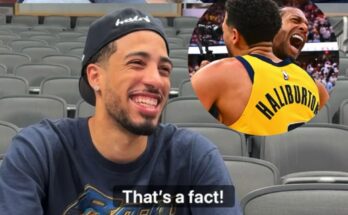
In sports, legacies are often measured in championships, records, and accolades. But sometimes, a legacy transcends the tangible and becomes something greater—an emotional connection, a cultural imprint, or a moment in time that continues to inspire long after the final whistle. For fans of the Oklahoma City Thunder, the legacy of the 2012 team is exactly that: a story of youth, promise, heartbreak, and endless potential. It’s a legacy that still echoes.
More than a decade later, the 2012 Thunder continue to loom large in NBA lore. They were young, fearless, and dynamic—a team powered by three rising superstars: Kevin Durant, Russell Westbrook, and James Harden. Each of them would go on to win MVPs and leave massive individual marks on the league. But together, in that single season, they were magic.
The 2012 Thunder made their way to the NBA Finals with a swagger and style that captivated fans. They beat established giants in the Western Conference: the defending champion Dallas Mavericks, the star-studded Los Angeles Lakers, and the legendary San Antonio Spurs. They did it with a mixture of athleticism, swagger, and joy that made the team impossible not to root for. Durant’s smooth scoring, Westbrook’s unrelenting energy, and Harden’s crafty playmaking created a three-headed monster that looked ready to take over the league for years.
And then, almost as quickly as it came together, it fell apart.
The Thunder lost to LeBron James and the Miami Heat in five games in the Finals. It was a learning moment, not a failure—everyone expected them to come back stronger. But that offseason, the team traded Harden to the Houston Rockets in a controversial move that stunned fans and signaled the end of an era before it had fully begun.
The legacy of that 2012 squad lives on not just because of what they achieved, but because of what could have been. It’s the ultimate “what if” in NBA history. What if the Thunder had kept Harden? What if that core had stayed together another few years? Would they have won a championship? Would they have changed the way teams are built today?
These questions don’t have answers, but they spark endless conversations. And that’s part of the legacy too—the way that one team, for one incredible season, captured the heart of a city and the imagination of a league.
In Oklahoma City, the echoes of that team still ripple through the arena. The energy of those 2012 playoff nights, the roar of the crowd, the belief in something special—all of it helped shape the identity of the franchise. Fans remember where they were when Durant hit clutch shots, when Westbrook flew down the lane, when Harden ran the second unit like a seasoned vet. It wasn’t just basketball. It was a feeling.
Young players entering the league today were kids when the 2012 Thunder were lighting it up. Many of them, like current Thunder standout Jalen Williams, cite that team as an inspiration. “Watching KD, Russ, and James back then—man, they were different,” Williams said in a recent interview. “You could feel how hungry they were. That stuck with me.”
Today’s Thunder are once again a team on the rise. With a new generation of talent led by Shai Gilgeous-Alexander, Jalen Williams, and Chet Holmgren, the franchise is looking toward the future. But they’re doing it with a deep respect for the past. The 2012 Thunder laid the foundation—not just in terms of success, but in spirit.
That spirit includes playing with passion, prioritizing team chemistry, and embracing the grind. It’s about more than wins and losses; it’s about the culture that was built in those early years. That culture continues to guide the organization today, and it’s why fans remain fiercely loyal, even through rebuilding seasons.

What made the 2012 team so special wasn’t just the talent. It was the belief. The belief that something was happening in Oklahoma City that the rest of the league couldn’t ignore. It was the trust the players had in each other, the humility they played with, and the joy they brought to the game. They were a team you could believe in.
And perhaps that’s the most powerful part of their legacy—the belief they inspired. They showed that a small-market team could build through the draft, develop their own stars, and compete at the highest level. They proved that with the right vision, patience, and culture, greatness was possible anywhere.
That belief is still alive today. It echoes in the way the Thunder develop their young players, in the chants of the fans, and in the memories of that magical 2012 run. It’s in every buzzer-beater, every big comeback, every glimpse of potential from a new star. The story isn’t over—it’s evolving.
Legacies aren’t always defined by rings. Sometimes, they’re defined by the hearts they touch, the players they inspire, and the paths they pave. The 2012 Oklahoma City Thunder may not have won a championship, but they left something just as meaningful behind—a legacy that still echoes.



